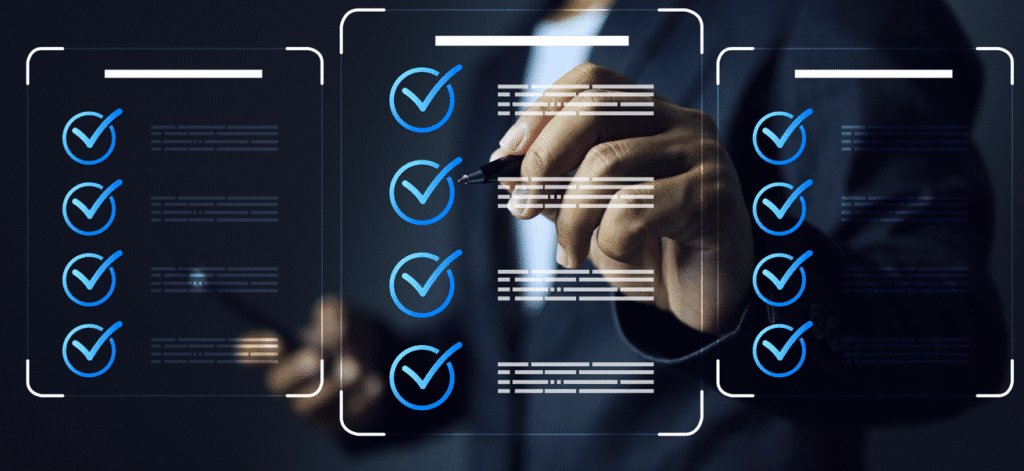In today’s world, where data breaches and cyber threats are everywhere, protecting your organization’s sensitive information is more critical than ever. This blog will break down ISO 27001, who needs it, its benefits, the risks of not following it, and provide a simple checklist to get started. Let’s see how adopting this framework can help your organization stay safe from cyber threats.
What is ISO 27001?
ISO 27001 is an internationally recognized standard that sets the rules for managing information security. Created by the International Organization for Standardization (ISO), it provides a structured way to protect important company data, ensuring it stays safe, accurate, and available when needed.
Key Parts of the ISO 27001 Framework
- Risk Assessment: Identifying and understanding the risks to your data.
- Management Commitment: Leadership must support and invest in security practices.
- Documentation: Keeping accurate records of security processes and policies.
- Continuous Improvement: Always looking for ways to enhance security measures.
Who Needs ISO 27001 Certification?
While any organization can benefit from ISO 27001, specific sectors should consider it more seriously:
- Government Contractors: Often required to meet strict security standards.
- Financial Institutions: Must protect customer data and comply with regulations.
- Healthcare Providers: Need to secure patient information under laws like HIPAA.
- Tech Companies: Must ensure strong security practices for software and data management.
- Any Business Handling Data: Organizations of all sizes can benefit from this structured approach.
Benefits of Being ISO 27001 Compliant
Getting ISO 27001 certified offers many advantages:
- Better Security: A thorough approach to identifying and reducing risks.
- Legal Compliance: Helps meet legal requirements, reducing fines and penalties.
- Increased Trust: Customers feel safer knowing their data is protected.
- Competitive Edge: Certification can set your business apart from others.
- Crisis Management: A solid security plan can help respond quickly to incidents.
Risks of Not Complying
While ISO 27001 compliance itself does not mean an organization will prevent all security incidents, the standards required an organization takes the right steps to build a robust security posture and can help to address serious problems that may be faced which include:
- Data Breaches: Higher chances of losing sensitive information.
- Legal Penalties: Big fines for not meeting security standards.
- Loss of Trust: Clients may only want to do business with you if they see effective data protection through certification.
- Business Disruptions: Inefficiencies that hurt your overall performance.
- Insurance Issues: Insurers may require compliance for coverage, leading to higher cost premiums or deductibles or outright denial of coverage.
Readiness Checklist
Before starting the DSS- ISO 27001 certification process, use this readiness checklist:
✓ Define the Scope: Determine what areas of your business will be covered.
✓ Conduct a Risk Assessment: Identify potential risks to your data.
✓ Establish Security Policies: Create clear security policies and procedures.
✓ Assign Roles: Ensure everyone knows their responsibilities in keeping data secure.
✓ Implement Controls: Put in place measures to reduce identified risks.
✓ Provide Training: Teach employees about security policies and their roles.
✓ Monitor and Review: Regularly check how well your security measures are working.
✓ Engage Stakeholders: Keep everyone informed about the importance of compliance.
Avoiding Costly Mistakes on Your Path to ISO 27001 Certification
In today’s digital landscape, safeguarding data is not just an operational necessity; it’s a strategic imperative for businesses of all sizes. Whether you pursue ISO 27001 certification to enhance your security posture, meet client demands, or facilitate growth, it’s crucial to navigate the compliance journey effectively.
Here are three costly mistakes to avoid:
Delaying Action
Waiting for a cyber incident to occur before prioritizing data security can be a disastrous misstep. Such a delay jeopardizes your data and can lead to significant financial losses and damage your reputation. Proactive measures are essential for building trust and ensuring business continuity. Although having ISO 27001 certification is an excellent preventative measure, breaches may still occur, but your organization will be better equipped to handle these situations.
Going Solo
While tackling ISO 27001 certification on your own may seem feasible, this approach can be risky unless you have in-house experts with deep compliance and cybersecurity knowledge. Achieving certification is complex and requires specialized guidance to navigate the nuances of the standard effectively. Don’t underestimate the value of professional support in this process.
Underestimating Effort and Time
Achieving ISO 27001 compliance is not a quick fix; it requires substantial time and resources. Many organizations underestimate the effort needed to align their systems and policies with the standard’s requirements. Ensure you have the right team in place and a commitment to addressing gaps thoroughly. Failing to do so can lead to even greater costs down the line.
By being aware of these pitfalls and planning accordingly, businesses can set themselves on a path to successful ISO 27001 certification, enhance their security framework, and foster confidence among stakeholders.
Conclusion
Achieving ISO 27001 certification is more than just a certification; it signifies a commitment to safeguarding sensitive information and effectively managing risk. Organizations across various sectors can reap substantial benefits from adopting this framework, including enhanced security, regulatory compliance, and increased customer trust. Real-world examples underscore the severe consequences of not following a robust industry framework such as ISO 27001, emphasizing the importance of taking proactive steps toward certification. By utilizing a readiness checklist and avoiding costly mistakes, organizations can pave the way for a successful ISO 27001 journey, ultimately positioning themselves as leaders in their given business vertical. In a world where the stakes are high, compliance isn’t just a box to check; it’s a strategic imperative.
Need more info?
We are here to help.
Our experts will identify strategies to close compliance gaps and safeguard your systems.
At Cyntry, simplifying the compliance journey and strengthening your security posture is what we do best.
Book a no-cost 30-minute compliance strategy session at Cyntry.com.



